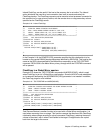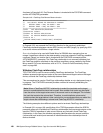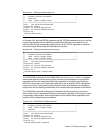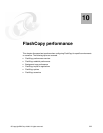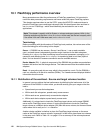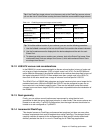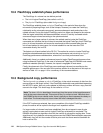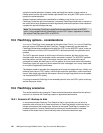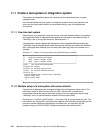
Chapter 10. FlashCopy performance 115
The recommended placement of the FlashCopy source and target volumes, regarding the
physical FlashCopy phase, was already discussed in the previous section. Refer to
Table 10-1 on page 113 for a summary of the conclusions. For the best background copy
performance, the implementation should always place the source and target volumes in
different ranks. There are additional criteria to consider if the FlashCopy is a
full box copy that
involves all ranks.
For full box copies, you should still place the source and target volumes in different ranks.
When all ranks are participating in the FlashCopy, it is still possible to accomplish this by
doing a FlashCopy of volumes on rank R0 onto rank R1, and volumes on rank R1 onto rank
R0 (for example). Additionally, if there is heavy
application activity in the source rank,
performance would be less affected if the background copy target was in some other rank
that could be expected to have lighter
application activity.
If background copy performance is of high importance in your environment, you should use
incremental FlashCopy as much as possible.
Incremental FlashCopy will greatly reduce the
amount of data that needs to be copied, and therefore greatly reduce the background copy
time.
10.4 FlashCopy impact on applications
One of the most important considerations when implementing FlashCopy is to achieve an
implementation that has minimal impact to the users’ application performance.
The relative placement of the source and target volumes has a significant impact on
application performance, and this has already been discussed in 10.1.1, “Distribution of the
workload - Source and target volumes location” on page 112.
In addition to the relative placement of volumes, the selection of COPY or NOCOPY is also
an important consideration in regard to the impact on application performance. Typically, the
choice of COPY or NOCOPY depends primarily on how the FlashCopy will be used and for
what interval of time the FlashCopy relationship exists. From a purely performance point of
view, the choice of whether to use COPY or NOCOPY depends a great deal on the type of
workload. The general answer is to use NOCOPY, but this is not always the best choice. For
most workloads, including online transaction processing (OLTP) workloads, NOCOPY is
Tip: The DS6000 gives higher priority to application performance than background copy
performance. This means that the DS6000 will throttle the background copy if necessary,
so that applications are not unduly impacted.
Note: The term full box copy has the implication that all rank resources are involved in the
copy process. Either all or nearly all ranks have both source and target volumes, or half the
ranks have source volumes and half the ranks have target volumes.
Note: As already mentioned, the recommendations discussed in this chapter only consider
the performance aspects of a FlashCopy implementation. But FlashCopy performance is
only one aspect of an intelligent system design. You must consider all business require-
ments when designing a total solution. These additional requirements—together with the
performance considerations—will guide you when choosing FlashCopy options like COPY
or NOCOPY and
incremental, as well as when making choices on source and target vol-
ume locations.



